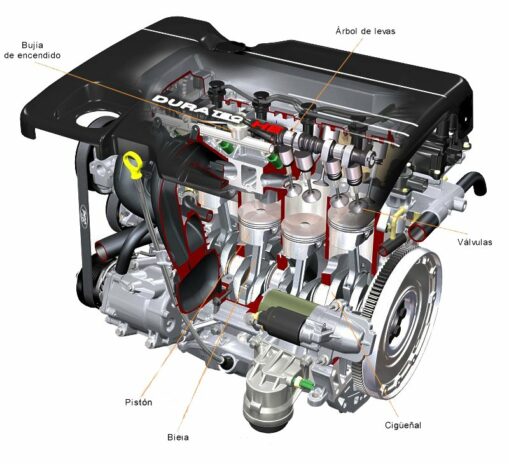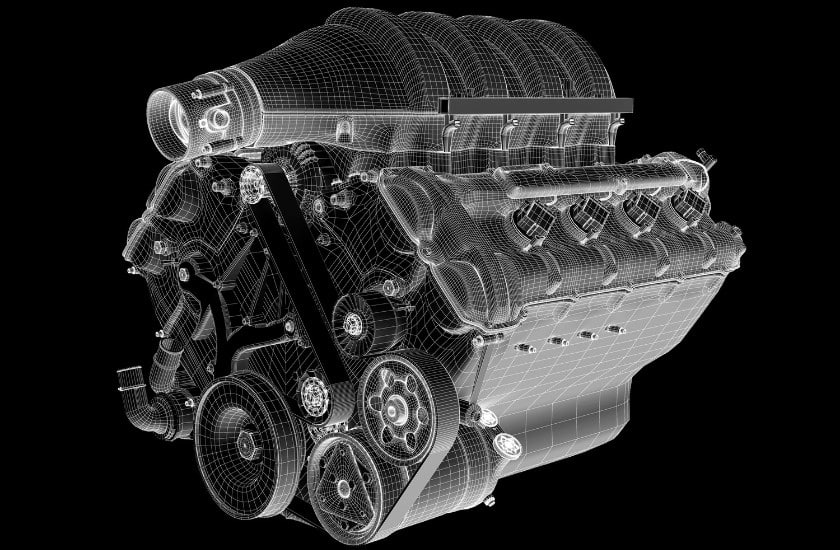Gasoline engines
We could define gasoline engines as thermodynamic machines responsible for converting the chemical energy of ignition, caused by the mixture of air and fuel, into mechanical energy to produce the movement of a vehicle.
Internal combustion engines that use gasoline as fuel are, at a structural level, very similar to those that use diesel or diesel, although we can extract different performances from each of them.

How does a gasoline engine work?
Gasoline engines, as we have indicated, work in four-stroke cycles, which roughly, we could explain that they run as follows:
- Intake: First, the intake valve opens, drawing the air and fuel mixture into the cylinders.
- Compression: Shortly before bottom dead center, the valve closes and the piston rises, thus compressing the mixture. The compression ratio will range between 8:1 and 11:1 depending on the type of engine and the performance we intend to obtain without exceeding these figures to avoid unwanted detonation.
- Explosion: Shortly before the top dead center, the spark plug spark will jump above fourteen thousand volts from the high voltage circuit, producing the explosion and the descent of the piston.
- Exhaust: In turn, the exhaust valve opens and the piston rises again, pushing the burned gases to be expelled through the exhaust system, and starting the complete cycle again.
We can consider that, in general, gasoline engines have better performance thanks to the fact that their combustion generates greater energy power , always determined by the octane rating of the fuel used, especially if we take into account criteria such as speed or acceleration capacity. .
Although there are those who see better performance in diesel engines by paying attention to other factors such as the compression ratio, since these allow optimizing the filling of air in the combustion chamber so that it is more usable through higher compression ratios; around 18:1, which allows the same work to be carried out with a smaller amount of fuel.
Comparatively, we can also say that gasoline engines are lighter, which allows them to rev more easily , so in general we can say that gasoline engines work better at high revolutions.
Joaquín Cué, one of our specialists in the spare parts department, tells us: “over the years that I have been working in the sector, it is not common to find requests for engine mounts or silent blocks for gasoline vehicles. This is because its system generates less vibrations and noises in the engine block .”
Market prices
Regarding market prices, the gasoline versions of most vehicles tend to have a lower cost and their repairs and parts are considerably cheaper, while on the other hand consumption is higher and the price of fuel is higher.
Another of our experts from the spare parts section, David Díaz, adds: “in the long run, a gasoline engine suffers more wear since it works at higher revolutions even when traveling at the same speed. The power is generated by a momentary explosion while the distribution of force is more linear in a diesel engine.”

Broadly speaking, these are the characteristics that make up a gasoline engine. If you want to know more differences with diesel engines, we recommend that you continue browsing our mechanics section.
| Feature | Advantages | Disadvantages |
|---|---|---|
| Cost | Lower initial cost | Lower fuel economy |
| Weight | Lighter | Higher emissions |
| Design | Simpler design | More noise |
| Performance | Better acceleration and higher RPMs | Less torque |
| Vehicle Availability | Wider range of vehicles available | Shorter engine life |
The notable advantages of using a gasoline engine
Gasoline engines have been a popular choice for decades due to their numerous advantages. Below, I will highlight some of the most significant advantages of using a gasoline engine:
1. Greater availability: Gasoline engines are widely used and therefore it is easier to find service stations and refuel compared to other types of engines.
2. Lower initial cost: Generally, gasoline engines are cheaper compared to other engines such as diesel or electric motors. This is because its technology is more established and widely used, which reduces manufacturing costs.
3. Higher power: Gasoline engines tend to be more powerful than other types of engines, making them ideal for vehicles that require quick acceleration and highway performance.
4. Less maintenance: Generally, gasoline engines require less maintenance compared to other engines. This is because its design is simpler and does not require particle filtering systems or urea injection systems, like diesel engines.
5. Longer durability: Gasoline engines usually have a longer lifespan compared to other engines. This is because its operation is less demanding and generates less wear on the internal parts of the engine.
6. Easier starting: Gasoline engines are known for their easier starting, even in cold weather conditions. They do not require additional heating systems, like diesel engines, which makes them more convenient for daily use.
7. Lower emission of polluting gases: Although gasoline engines emit polluting gases, such as carbon dioxide (CO2), their emission is lower compared to diesel engines. In addition, technological advances have allowed the implementation of more efficient emissions control systems, which contributes to the reduction of environmental pollution.
The fascinating operation of a gasoline engine: Everything you need to know
Gasoline engines are one of the most important inventions in human history. These engines are widely used throughout the world, both in vehicles and in various equipment and machinery. In this article, we will explain in detail how a gasoline engine works and what elements make it up.
1. Introduction to gasoline engines
Gasoline engines are known as internal combustion engines, since the combustion of fuel occurs inside the engine. These engines use gasoline as the main fuel and operate through a four-stroke process: intake, compression, explosion and exhaust.
2. Major Components of a Gasoline Engine
A gasoline engine is made up of several key components that work together to generate power and make the engine run. These components include:
– Cylinders: Gasoline engines have several cylinders, where fuel combustion takes place. The number of cylinders may vary depending on the engine size.
– Pistons: Pistons move inside the cylinders and are responsible for compressing fuel and air before explosion.
– Camshaft: The camshaft controls the opening and closing of the intake and exhaust valves, allowing fuel and air to enter and exhaust gases to exit.
– Valves: The intake and exhaust valves open and close at specific times during the engine operating cycle, allowing the entry of air and fuel and the expulsion of exhaust gases.
– Spark plugs: Spark plugs generate an electrical spark that ignites the air-fuel mixture inside the cylinder, causing the explosion necessary to drive the piston.
3. Operating cycle of a gasoline engine
The operating cycle of a gasoline engine consists of four strokes:
– Intake: During this time, the intake valve opens and the piston moves down, allowing a mixture of air and fuel to enter the cylinder.
– Compression: The intake valve closes and the piston rises, compressing the air-fuel mixture.
And here we end our walk through the bowels of gasoline engines! I hope you enjoyed this journey full of sparks and controlled explosions as much as I did. Now that you know all the secrets hidden under the hood of your car, you will surely feel like a real racing mechanic.
Remember, the next time you start your engine, think about all the engineering wonders that are happening inside it. And if you ever dare to tune your car, don’t forget that the power is not only on the outside, but also in the heart of that four-wheeled beast!
So now you know, if one day you find yourself in front of a car with the hood open and someone asks you if you know the secrets behind its gasoline engine, you can answer with confidence and a smile on your face: “Of course! “I am a regular reader of Polarities and I know everything there is to know about gasoline engines.” And then you can add a touch of mystery and say, “But if I tell you, I’d have to kill you.”
Until the next adventure in Polarities, where we will continue exploring the mysteries and wonders of the world around us! Stay curious and always ready to discover new polarities in every corner of the universe. See you on the next page!